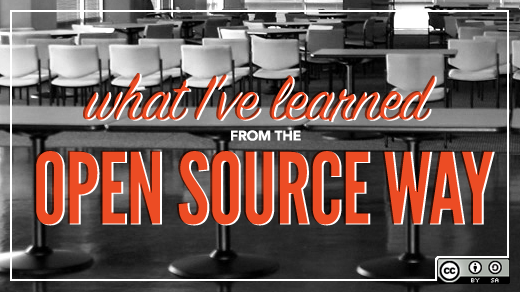This is the second in a series exploring the things I have learned from the open source way during my journey with Red Hat.
In the traditional proprietary software world, developers are limited in their ability to collaborate with other developers outside of their own companies. In contrast, developers in the open source software world collaborate beyond the walls of the company. And collaboration isn’t limited to software development, but also extends to collaborating in multiple ways with customers and partners.
This kind of broad collaboration is a key tenet of the open source way. Creating a culture that nurtures collaboration both inside and outside of various corporate functions, as well as outside of the corporate walls, is a difficult task. But when a culture is primed for collaboration, I’ve noticed an interesting side effect:
People tend to more willingly step outside their comfort zones, span boundaries, and take on new responsibilities. And sometimes they find that becoming a “collaborator” or “boundary spanner” can result in unexpected career opportunities.
I’ll offer my story as an example.
A couple of years after beginning work at Red Hat, I had my second child and returned from maternity leave with a new set of responsibilities at home. In my mind, I needed to rebalance my work/life scale to be more heavily weighted toward home. Our general counsel, Mark Webbink (open source licensing guru), had other ideas, and he approached me about participating in Red Hat’s leadership development program, which we call “Brave New World.”
In the Brave New World program, a few employees from around the globe and from different functions within the organization are brought together to select and work on a strategic problem facing the company. The program creates an opportunity not just to collaborate with others in different parts of the organization, but also to contribute beyond your own day to day role.
In my case, it was a huge turning point because I was not being asked to use my lawyer skills or to be a consultant to the business, but instead to contribute outside of my normal skill set and comfort zone and to be a member of a larger team.
While I was tentative about my ability to live up to additional responsibilities with a new baby at home, I realized that this opportunity could stretch me in new directions, so I took a deep breath and joined the program.
My Brave New World team took on the challenge of trying to create a culture of recognition at Red Hat. During the project, I started learning about “HR stuff”--compensation, engagement, recognition, rewards, etc. I developed new competencies and relationships, and we ended up developing a spot recognition program called the Reward Zone that, five years later, is still broadly used by Red Hat associates around the world.
Why do I tell this story? Because it was an experience in collaboration and boundary spanning that pushed me beyond my core skills, helped me to develop a broader perspective of the needs of other functions, and made me better understand the points of view of others. It also gave me the introduction to the HR field. So I attribute to Brave New World my eventual move to HR.
This move would have never happened if I had stayed in my lawyer lane and turned down the opportunity to collaborate with my colleagues through Brave New World.
On reflection, I see that when there is a culture of collaboration in the organization, this sort of career transformation quits being a happy accident and instead becomes part of the master organizational plan.
At Red Hat, we have a wonderful open source ecosystem, so many of our new employees already have been collaborating with Red Hat, for years in some cases, before their hire dates. As one example, our engineering team draws many of its recruits from the Fedora Project and other community efforts in which Red Hat participates.
Many open source software developers have the opportunity to learn new skills or get new experiences because they are able to collaborate with Red Hat (and other companies that operate the open source way) before they accept jobs. They, too, stretch beyond their day-to-day roles and take chances to experience new things as an investment in themselves.
Many contributors have found this investment in boundary spanning has paid off. My observation? When things are done the open source way, this kind of success story is common.
I’ve personally benefited from learning how to step out of my comfort zone and span my boundaries, and I hope that you will be inspired to do so too. If you have a story to share on this topic, I'd love to hear it.






2 Comments